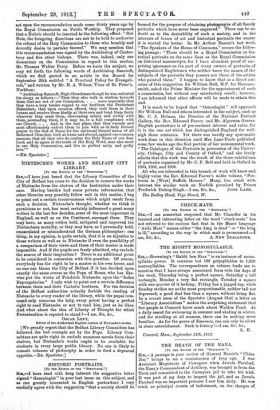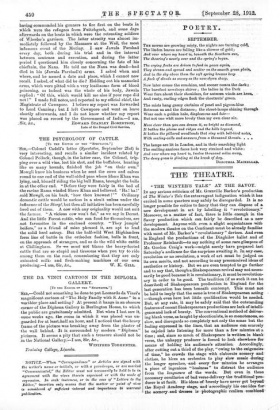THE DEATH OF THE NANA.
[To THE EDITOR OP' THE "SPECTATOR.'] SIR,—A passage in your review of General Harris's "China Jim" brings to me a reminiscence of long ago. I was Assistant Magistrate of Cawnpore when Jawala Parshad, the Nana's Commandant of Artillery, was brought in from the Terai and committed to the Cawnpore jail to take his trial. It was part of my duty to inspect the jail, and as Jawals. Parshad was an important prisoner I saw him daily. He was tried, as principal counts of indictment, on the charges of Invitng -commanded his gunners to fire first. on the beats in which were the refugees from Futtehgnrh, and some days afterwards oil, the boats in. which were the -retreating soldiers of Wheeler's garrisou. The latter atrocity was almost im- mediately followed by the Maasaere at the Well, the moat infamous event of th,e Mutiny. I saw Jawala Parshad 'every day, both. during his trial and in the interval between 'sentence and execution, and during the -latter period I questioned him closely concerning the fate of his chieftain, the Nana. He told me the Nana was dead—had died. in his (Jawala. Parshad's) arms. I asked when and where, and he named a date and place, which I cannot now recall I asked, of what did he die P Holding out his manacled arms, which were pitted with a very loathsome form of blood poisoning, as indeed was the whole of his body, Jewel& replied "Of this, which would kill me also if your rope did mot ! " I made full notes, and reported to my official chief, the Magistrate of Cawnpore. I believe my report was forwarded to Lord Canning ; but ,I left Cawnpore and went on leave
• shortly afterwards, and I do not know whether my report was placed on record by the Government of India.—I am, _Sir, &o., EDWARD STANLEY ROBERTSON,
Late of the Bengal Civil Service.















































 Previous page
Previous page